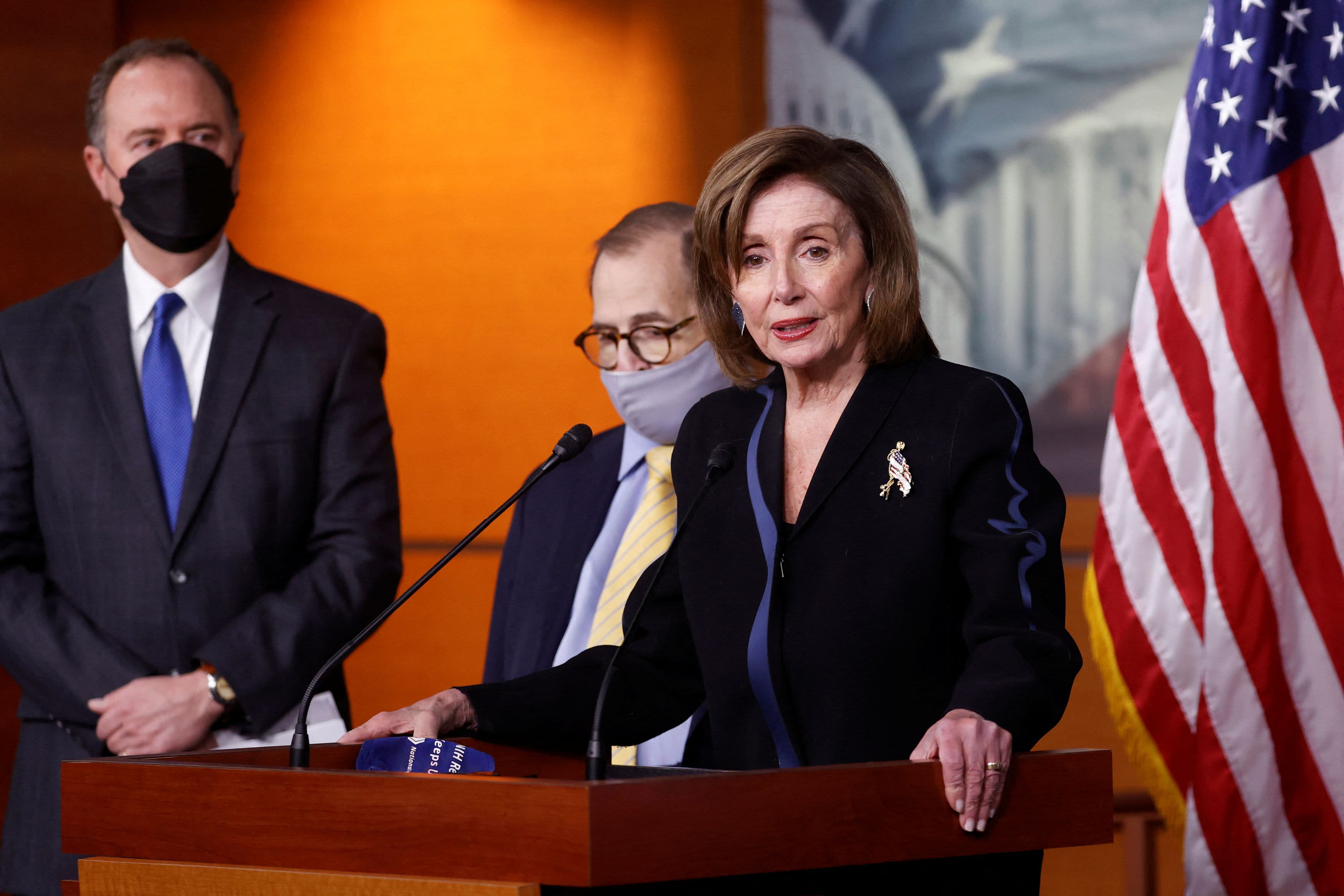
U.S. House Speaker Nancy Pelosi (D-CA), with Representative Adam Schiff (D-CA) and Representative Jerry Nadler (D-NY), holds a news conference for their Protecting Our Democracy Act to attempt to create checks and balances on presidential power, on Capitol Hill in Washington, December 9, 2021.
Jonathan Ernst | Reuters
The U.S. House on Wednesday passed legislation that would fund the government through September and send nearly $14 billion in aid to Ukraine as it struggles to fend off an invasion by Russia.
Congress has to pass a spending bill by Friday to prevent a government shutdown. To give the Senate enough time to vote on it, the House passed a second bill to extend current funding through Tuesday.
The Senate will need to approve both spending measures and send them to President Joe Biden for his signature.
The House ran into roadblocks Wednesday as Democratic leaders were forced to scrap $15.6 billion in coronavirus relief funds from the larger $1.5 trillion legislation. An impasse over the money delayed a planned vote by hours.
“We must proceed with the omnibus today, which includes emergency funding for Ukraine and urgent funding to meet the needs of America’s families,” House Speaker Nancy Pelosi, D-Calif., wrote to House Democrats. “It is heartbreaking to remove the COVID funding, and we must continue to fight for urgently needed COVID assistance, but unfortunately that will not be included in this bill.”
House Appropriations Committee Chair Rosa DeLauro, D-Conn., introduced a separate coronavirus aid bill later Wednesday. The chamber aims to vote on the legislation next week.
The last-minute change followed weeks of talks that led to a deal on the spending bill. Democrats and Republicans had to settle disputes over how much to hike spending on domestic programs and the military — a debate that evolved after Russia attacked Ukraine last month.
The legislation is expected to pass with support from both parties. The House approved the spending package in two pieces Wednesday night, divided between defense and nondefense funding. The first piece, which includes the Ukraine aid, passed by a 361-69 margin, while the second portion was approved in a 260-171 vote with less Republican support.
Senate Minority Leader Mitch McConnell, R-Ky., backs the funding bill and said he would urge his caucus to vote for it. The Biden administration also supports the plan.
Congress for years has used short-term spending bills to dodge shutdowns with last-minute votes. Funding lapses can lead to furloughs of federal workers, disruptions to government services and broad economic damage.
Both parties also want to prevent a shutdown to avoid an appearance of dysfunction as the U.S. takes a leading role in the international effort to hamstring Russia’s economy and bolster Ukraine’s defenses. The House aims to add to the pinch around the Kremlin in a planned Wednesday vote to ban oil imports from Russia — a step Biden took Tuesday as he faced pressure from both parties in Congress.
The new spending bill fits into the broader U.S. strategy in Ukraine. The $13.6 billion set aside for the conflict would fund aid for displaced Ukrainians, equipment for the country’s military and U.S. troop deployments to neighboring nations.
Biden’s Office of Management and Budget said the money would allow the U.S. “to respond quickly and efficiently to the emerging and evolving needs in Ukraine, across the region, and around the world.”
The $1.5 trillion bill includes $782 billion in defense spending and $730 billion for nondefense programs. Many Democrats and a handful of Republicans have long tried to rein in military funding as the U.S. maintains its place as by far the biggest spender on defense in the world.
McConnell said the bill contained more defense funding than the Biden administration first proposed and more money to support Ukraine’s military than Democrats wanted.
While coronavirus infections in the country have plummeted since the worst of the wave driven by the omicron variant, the Biden administration sought more money to respond to possible future twists in the pandemic. Pelosi and Senate Majority Leader Chuck Schumer, D-N.Y., earlier Wednesday said the proposed money would help the U.S. “protect and treat against new variants, avoid shutdowns and fight the virus abroad.”




